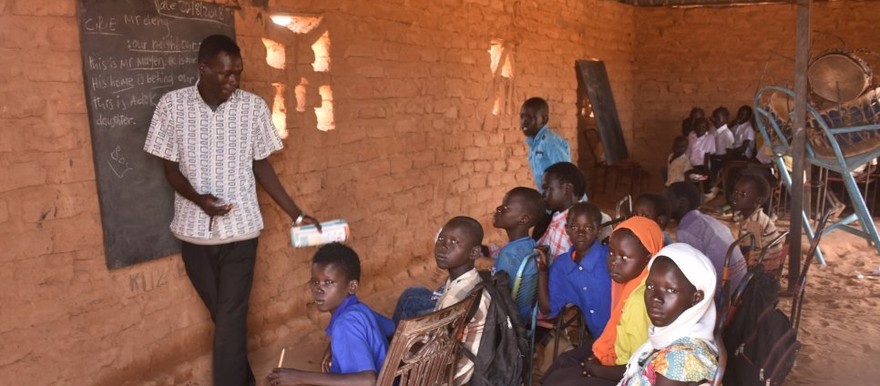Sudan hosts more than 800,000 South Sudanese refugees according to the United Nations High Commissioner for Refugee, UNHCR, ranking it second to Uganda which hosts the largest refugee population in the region.
The refugees face a host of challenges including a lack of clean drinking water, employment and educational opportunities, restriction of movement, and insufficient food.
World Refugee Day is celebrated every June 20 with this year's theme being 'Together we heal, learn and shine'. To commemorate this day, we at Radio Tamazuj chose to highlight the plight of South Sudanese refugees in Sudan with a special focus on education.
Paulino Akany, the head of the refugee education committee in White Nile State in Sudan said both teachers and students face challenges as children lack educational opportunities while teachers have to make do with a merger USD 10 monthly salary to sustain themselves.
He revealed that teachers in different camps within the state have gone without salaries for more than nine months despite an economic crisis in the country.
Akany said the teachers demand a salary increment. "The UNHCR provides the funds and the ministry receives them to pay the teachers."
"Five months ago, the teachers' committee traveled to Khartoum, and we conducted a meeting with humanitarian organizations and the government and no solution was reached. The ministry of education issued an administrative order to treat South Sudanese refugee teachers as Sudanese, but the ministry in White Nile State here refuses to implement the decision," he added.
Akany said they are pursuing legal avenues to pressurize the UNHCR to increase their salaries, "I am currently talking to you within the legal department in Kosti, to open a case against the UNHCR, because the teacher's salary is only 2,000 Sudanese Pounds, and we reject this amount."
According to Akany, there are slightly more than 400 teachers in White Nile State refugee camps spread across 16 primary schools and seven secondary schools. But, he says, the number of teachers is still very low as a class could have an average of 200 students.
Emmanuel Chol, a refugee in one of the camps, told Radio Tamazuj that most children in the camp are out of school.
“There are homeless children who lack educational opportunities, and even the available education is poor because of many challenges facing refugee families in Sudan,” he said.
“We suffer from many problems in our education. Children have an unknown future, and we want to create a future for them by opening adult education for those outside the classrooms," Achwel Arop Otong, an education official in the camps said. "In the White Nile, refugee families are unable to afford education in private schools. For example, the Shilluk community chief here has seven children, and he is unable to admit them to school, and many families are facing the same."
Arop adds, "There is no education here. We spoke with the UNHCR to open community-based literacy schools for children outside the school, but the ministry rejected the idea."
Teachers in the refugee camps
Akany, the head of the refugee education committee, says teachers just like everyone in Sudan have been immensely affected by the economic crisis facing the country.
"Some teachers go to do hard labor to get a daily income because the food provided by the humanitarian organizations is not sufficient for a whole month," he said.
According to him, teachers lack training opportunities, textbooks, and face numerous security threats.
"UNHCR does not do much. For the secondary school students, they only provide transportation during the examination period," he said.
He called on other aid organizations to intervene and provide the much-needed education for South Sudanese across the nine refugee camps in White Nile State.
For his part, Arop, the refugee education committee secretary said, "The situation we are in is very difficult. Therefore we will continue to address teachers’ issues because they wait for long although they are unable to provide to buy soap, food, and medicine."
White Nile State education ministry
Responding to the teachers' concerns, White Nile State education minister Wedad Muhammad al-Hassan categorically stated that the issue of teachers' salaries is not within her ministry's scope because they are mainly volunteers and are paid by the UNCHR.
However, she acknowledged that she has severally engaged the UN agency to increase the teachers' salaries.
"I have talked many times to the UNHCR on the need to increase the salaries of teachers in the camps, to ensure the stability of education there," she stated.
A major challenge facing refugee education is that most schools in the camps are listed as private schools using English as a medium of instruction. But there are calls to list those schools as refugee schools so that high school fees are waived for the students.
The minister denied the existence of an order by the national education ministry to classify refugee teachers as host teachers. However, Radio Tamazuj obtained a document stipulating those instructions confirmed by the head of the education committee Paulino Akany.
UNHCR
An education official from the UN refugee agency in the state, Imam Abdelgadir, when contacted by Radio Tamazuj said, "I do not have the mandate to speak to the media."
The total number of South Sudanese refugees has now passed 2 million, it is the largest refugee crisis in Africa, and the third-largest in the world, after Syria and Afghanistan. Sadly, 63 percent of South Sudanese refugees are under the age of 18, the UNHCR says.




